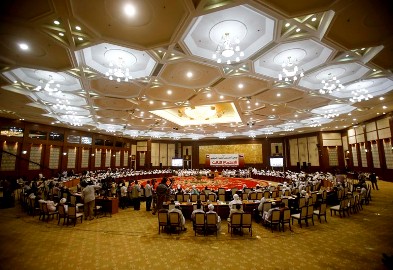Sudan to launch a large media campaign to promote national dialogue
September 2, 2015 (KHARTOUM) – The Sudanese government on Wednesday said it will launch a major media campaign to promote the national dialogue during the next three months.

He noted that the information ministry would implement the presidential decree number 158 which gives all political parties participating in the dialogue opportunities to appear on the state-owned media.
Youssef, who spoke at the meeting of the information secretariats of the political parties which are part of the dialogues’ coordination body known as 7+7, stressed that the national radio and TV and the official news agency (SUNA) besides Ashorooq and the Blue Nile TV channels would be devoted to activate the dialogue in the coming period.
The minister further announced that a website for the national dialogue will be launched besides several pages on the social media sites, adding the campaign budget amounts to 150,000 pounds (SDG).
Meanwhile, the member of the 7+7 mechanism form the opposition side, Fadl al-Sid Shuaib, emphasized the media would be dedicated to national dialogue, denying that the ruling National Congress Party (NCP) is controlling as is commonly believed.
He stressed that all political parties are free to use the media, saying the National Intelligence and Security Services (NISS) doesn’t have the powers to prevent them.
“If [the NISS] prevented any party [form using the media], it should complain to the 7+7 subcommittee for creating conducive environment for the dialogue”, he added
The Sudanese president Omer Hassan al-Bashir launched the national dialogue initiative more than a year and a half ago in which he urged opposition parties and rebels alike to join the dialogue table to discuss all the pressing issues.
But the initiative faced serious setbacks after the government refusal to create suitable atmosphere by releasing political prisoners, ensuring freedoms, and postponement of elections.
The rebel groups and the opposition alliance of the National Consensus Forces (NCF) refused to join the process from the beginning while the National Umma Party (NUP) led by al-Sadiq al-Mahdi withdrew from the process in protest of al-Mahdi’s arrest in May 2014.
Later on, several political parties including the Reform Now Movement (RNM), and the Alliance of the Peoples’ Working Forces (APWF) announced they had decided to suspend participation in the national dialogue until the requirements of a conducive environment are met.
(ST)
